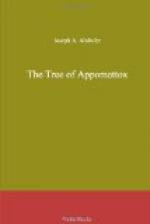“Go straight back to peace,” replied Warner promptly. “I know my own ambition. I’ve told you already that I intend to be president of Harvard University, and, barring death, I’m bound to succeed. I give myself twenty-five years for the task. If I choose my object now and bend every energy toward it for twenty-five years I’m sure to obtain it. It’s a mathematical certainty.”
“I’m going to be a great ranchman in Western Nebraska with my father,” said Pennington. “He’s under fifty yet, and he’s as strong as a horse. The buffalo in Western Nebraska must go and then Pennington and Son will have fifty thousand fine cattle in their place. And you, Dick, have you already chosen the throne on which you’re going to sit?”
“Yes, I’ve been thinking about it for some time. I’ve made up my mind to be an editor. After the war I’m going to the largest city in our state, get a place on a newspaper there and strive to be its head. Then I’ll try to cement the reunion of North and South. That will be my greatest topic. We soldiers won’t hate one another when the war is over, and maybe the fact that I’ve fought through it will give weight to my words.”
“I’ll tell you what I’ll do,” said Warner. “When I’m president of Harvard I’ll invite the great Kentucky editor, Richard Mason, to deliver the annual address to my young men. I like that idea of yours about making the Union firmer than it was before the war. Since the Northern States and the Southern States must dwell together the more peace and brotherly love we have the better it will be for all of us.”
“When you give me that invitation, George, you’d better ask my cousin, Harry Kenton, at the same time, because it’s almost a certainty that he will then be governor of Kentucky. His great grandfather, the famous Henry Ware, was the greatest governor the state ever had, and, as I know that Harry intends to study law and enter politics, he’s bound to follow in his footsteps.”
“Of course I’ll ask him,” said Warner in all earnestness, “and he shall speak too. You can settle it between you who speaks first. It will be an exceedingly effective scene, the two cousins, the great editor who fought on the Northern side and the great governor who fought on the Southern side, speaking from the same stage to the picked youth of New England. Pennington, the representative of the boundless West, shall be there too, and if the owner of fifty thousand fine cattle roaming far and wide wants to make an address he shall do so.”
“I don’t think I’d care to speak, George,” said Pennington. “I’m not cut out for oratory, but I certainly accept right now your invitation to come. I’ll sit on the stage with Dick and the Johnny Reb, his cousin Harry, and I’ll smile and smile and applaud and applaud, and after it’s all over I’ll choose a few of your picked youth of New England, take ’em out west with me, teach ’em how to rope cattle, how to trail stray steers and how to take care of themselves in a blizzard. Oh, I’ll make men of ’em, I will! Now, what is that on the high hill to the south?”




